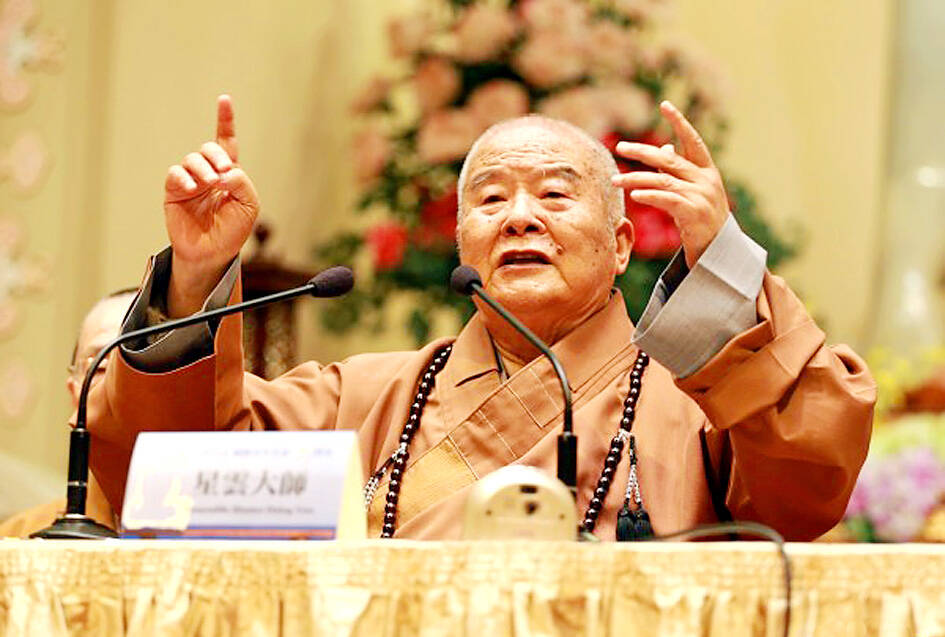Buddhist Master Hsing Yun (星雲法師), founder of the Kaohsiung-based Buddhist organization Fo Guang Shan, died on Sunday at the age of 95.
Fo Guang Shan yesterday confirmed in a statement that Hsing Yun had passed away peacefully at 5pm the previous evening.
A memorial service is to be held at Fo Guang Shan’s Cloud Dwelling Building at 9am on Monday next week.

Photo: Chen Chia-yi, Taipei Times
Hsing Yun, born as Lee Kuo-shen (李國深) in 1927 to a poor family in China’s Jiangsu Province, became interested in Buddhism at age 12 after visiting Nanjing’s Qixia Temple while on a trip to the city with his mother in an unsuccessful effort to find his father.
After taking his religious vows, he graduated from Jiaoshan Buddhist Seminary in 1947. Two years later, he moved to Taiwan, where he taught and was editor-in-chief of the Buddhist publication Humanity Magazine.
In 1967, Hsing Yun founded Fo Guang Shan in Kaohsiung as a monastery with the purpose of promoting “the principles of humanistic Buddhism and foster[ing] peace and harmony among all peoples of the world.”
Fo Guang Shan gradually expanded into education, charity and media. It also founded more than 300 temples worldwide, as well as Buddhist seminaries, libraries and publishing companies.
Beginning in 1991, Hsing Yun established Fo Guang University and Nanhua University in Taiwan, University of the West in the US, Nan Tien Institute in Australia and Guang Ming College in the Philippines.
Since 2015, the five institutions have offered cross-enrollment and exchange programs as part of the Fo Guang Shan University Consortium.
In the past few decades, Hsing Yun also became increasingly involved in China, where he donated funds for the construction of temples and libraries, ran educational and cultural programs, and promoted cross-strait exchanges.
After suffering strokes in 2011 and 2016, Hsing Yun’s health deteriorated and he began making fewer public appearances.
He officially stepped down as director of Fo Guang Shan in 1985, but remained involved in its operations. The organization has been led by Hsin Bao (心保) since 2013.
President Tsai Ing-wen (蔡英文) and Premier Chen Chien-jen (陳建仁) yesterday offered their condolences following Hsing Yun’s death, while expressing respect for his legacy of charity and compassion.

POSITIVE DEVELOPMENT: Japan and the US are expected to hold in-depth discussions on Taiwan-related issues during the meeting next month, Japanese sources said The holding of a Japan-US leaders’ meeting ahead of US President Donald Trump’s visit to China is positive news for Taiwan, former Japan-Taiwan Exchange Association representative Hiroyasu Izumi said yesterday. After the Liberal Democratic Party’s landslide victory in Japan’s House of Representatives election, Japanese Prime Minister Sanae Takaichi is scheduled to visit the US next month, where she is to meet with Trump ahead of the US president’s planned visit to China from March 31 to April 2 for a meeting with Chinese President Xi Jinping (習近平). Japan and the US are expected to hold in-depth discussions on Taiwan-related issues during the

‘LIKE-MINDED PARTNER’: Tako van Popta said it would be inappropriate to delay signing the deal with Taiwan because of China, adding he would promote the issue Canadian senators have stressed Taiwan’s importance for international trade and expressed enthusiasm for ensuring the Taiwan-Canada trade cooperation framework agreement is implemented this year. Representative to Canada Harry Tseng (曾厚仁) in an interview with the Central News Agency (CNA) said he was increasingly uneasy about Ottawa’s delays in signing the agreement, especially as Ottawa has warmed toward Beijing. There are “no negotiations left. Not only [is it] initialed, we have three versions of the text ready: English, French and Mandarin,” Tseng said. “That tells you how close we are to the final signature.” Tseng said that he hoped Canadian Prime Minister Mark Carney

President William Lai (賴清德) yesterday bestowed one of Taiwan’s highest honors on Saint Vincent and the Grenadines (SVG) Ambassador Andrea Clare Bowman in recognition of her contributions to bilateral ties. “By conferring the Order of Brilliant Star with Grand Cordon on Ambassador Bowman today, I want to sincerely thank her, on behalf of the Taiwanese people, for her outstanding contribution to deepening diplomatic ties between Taiwan and SVG,” Lai said at a ceremony held at the Presidential Office in Taipei. He noted that Bowman became SVG’s first ambassador to Taiwan in 2019 and

A man walks past elementary school artworks at the Taipei Lantern Festival in Ximen District yesterday, the first day of the event. The festival is to run from 5pm to 10pm through March 15.